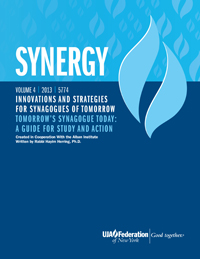I’ll write about some of the strategies which I’ve learned for getting congregants involved in synagogue life in future posts. But now, I want to look specifically at the big picture opportunity rabbis have in identifying and cultivating talent within and outside of their synagogue communities.
The American Jewish community is highly educated, accomplished in the arts, education, business, and professions like medicine, law and accounting. While college is certainly not the right track for every young person, Jews have an exceptional level of undergraduate and post-graduate education. The aspirations of our ancestors in Europe, who left their countries of origin for a better life in “the new world,” have by and large been fulfilled.
Yet, rabbis often allow great talent to slip through their fingers. (While lay leaders also have to be involved, rabbis have a unique opportunity to be talent scouts, because members are often disinclined to refuse their requests.) The limited research that we have on whether congregants feel valued for their talent is discouraging. I’ve often felt that members are the most underutilized yet potent force in the congregation. So especially in these trying times, rabbis have to “step up to the plate” and act more enthusiastically in this role.
In order to do so, we’re going to have to debunk a couple of unconscious biases we have. The first is that if someone doesn’t have a certain level of ritual practice or halakhic (legal) knowledge, they don’t have much to contribute. My experience has been quite the opposite. For example, if you know of someone who has expertise in communications, if you or someone else knowledgeable in these other areas is willing to work with this communications expert, then collaboratively you can do some outstanding work. More important than the work itself, you may find this volunteer will become curious about the “Jewish” piece, want to learn more, and become more involved in the synagogue community.
The second myth is that it’s easier to go it alone then to ask for help. Okay, maybe it is easier to accomplish a task alone, and not every task needs volunteer help. However, for more significant and complex work, the process or work product that you create will not have the same excellence that it could if you partnered with a volunteer.
The third myth is that once you’ve gotten the commitment of a new volunteer for a project, your job is over. As a talent scout, it’s important to help create a climate in which a volunteer’s abilities can flourish. That means that it’s important to check in with them as they start, give them a clear role, thank them for their help, and be available for questions which they may have.
So I’d like to hear from you about:
- A success story involving a volunteer.
- What are the other dimensions of being a talent scout if you’re a rabbi? What you perceive these other dimensions to be if you’re a congregant?
Shabbat shalom and a chag kasher v’sameach!
Rabbi Hayim Herring
Image from flickr.com, photographer’s home page here
 That’s why I’m happy to introduce you to another resource that provides you with concrete, practical tools to support your efforts around collaboration, and strategies to increase communications, connections and meaning in your congregation. This free, download is titled, Tomorrow’s Synagogue Today: A Guide for Study and Action, and it’s a seven step implementation guide to some of the key ideas in my book, Tomorrow’s Synagogue Today. Creating Vibrant Centers of Jewish Life. In addition to collaboration, you’ll find six additional units, on topics ranging from becoming an entrepreneurial congregation to preparing for the future by better anticipating trends that may have an impact on your congregation.
That’s why I’m happy to introduce you to another resource that provides you with concrete, practical tools to support your efforts around collaboration, and strategies to increase communications, connections and meaning in your congregation. This free, download is titled, Tomorrow’s Synagogue Today: A Guide for Study and Action, and it’s a seven step implementation guide to some of the key ideas in my book, Tomorrow’s Synagogue Today. Creating Vibrant Centers of Jewish Life. In addition to collaboration, you’ll find six additional units, on topics ranging from becoming an entrepreneurial congregation to preparing for the future by better anticipating trends that may have an impact on your congregation.